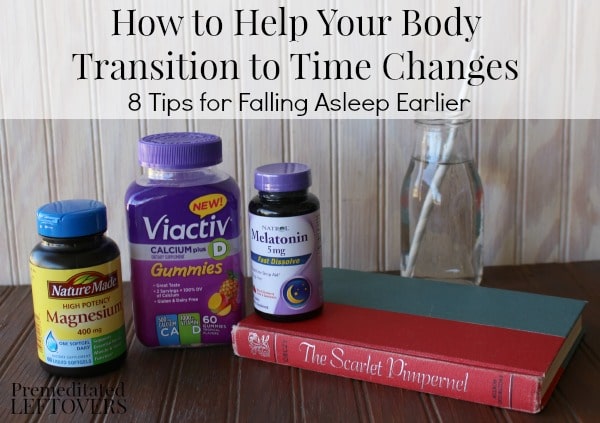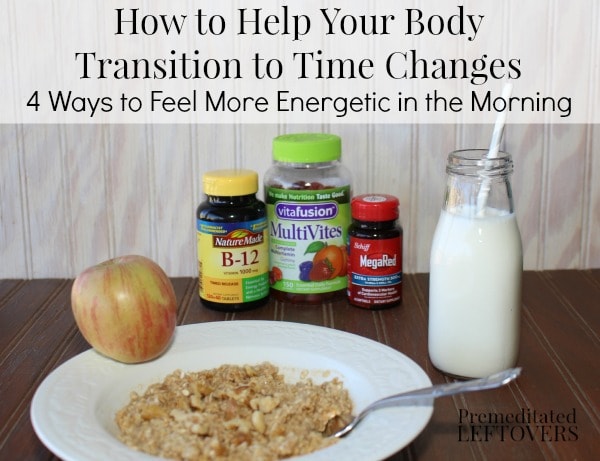Disclosure: Compensation was provided by Walgreens via Mode Media. The opinions expressed herein are those of the author and are not indicative of the opinions or positions of Walgreens.
Does the time change throw your schedule for a loop? While I love the extra hour of sunlight we receive during daylight savings time, my body is not very happy with the time change and is even unhappier when we change back to standard time! Transitioning your body to daylight savings time and then back is much harder than moving your clocks forward or back an hour!
If you travel, you know that it can also be hard to adjust to a new time zone. It can take a while to adjust to a new schedule, but sometimes you need to speed up the process. Below are some ways to help your body transition to a time change, so you can speed up the process of adjusting to a new time or time zone.
How to Help Your Body Transition to Time Changes
If I don’t get enough rest, I am more likely to get sick. Combine short sleep with the fluctuating weather systems and the extended cold and flu season and it creates the perfect environment for me to come down with something. I don’t have time to get sick until next July, so it is important that I proactively take steps to remain healthy. An easy way to do that is to follow a healthy diet and get the proper amount of sleep each night.
Tips for Falling Asleep Earlier
Avoid Stimulants 6 hours before bedtime. I know you start dragging in the late afternoon, but avoid reaching for that cup of coffee. Late in the day caffeine consumption will make it harder to fall asleep and you will feel even worse the next day.
Avoid sugar. Minimize that mid-afternoon slump by avoiding sugar. What ever boost you get from consuming sugar will be negated by the sugar slump that follows. And that slump will increase the chances that you will reach for a cup of coffee to help you stay awake. It is a vicious cycle.
Turn off electronics an hour before bedtime. Watching television or playing on the computer have actually been shown to make it harder to fall asleep. Instead start winding down by doing something relaxing like reading or listening to soothing music.
Relax in a soothing bath. Do you have a hard time unwinding? Take a warm bath. Add a cup of Epsom salt to make it extra relaxing. A warm bath helps raise your body temperature. Once you get out of the bath the rapid temperature drop helps triggers sleep.
Lower your thermostat. The optimum sleeping temperature varies for each person, but is usually between 65 to 70 degrees. A mild drop in temperature induces sleep, but a room that is too cold, can lead to tossing and turning.
Turn off the lights. We know that it is hard to sleep when the sun is till up, but artificial light can also disturb your sleep. Turn off your lights, your computer screen, t.v., and even your cell phone, so that the light that is emitted doesn’t disturb your sleep.
Keep a note pad beside your bed. Do you suddenly remember everything you need to do once you climb in bed? Instead of stewing over your to-do list, write it down and let it go.
Supplement if necessary. I have found that taking magnesium in the evening helps me relax. Interestingly, last spring I started craving bean burritos. When I told my doctor (yeah, I know, I share weird things with him) he ordered a blood test to see if I was deficient in magnesium, since beans are a good source of magnesium. It turns out that I was low in magnesium. He didn’t think I could eat enough burritos to get my levels up to a normal level and told me to start supplementing.
When I am really having trouble falling asleep, I will take melatonin. I don’t use it regularly, and when I do use it I only use it for a few days, but it does help when I need to quickly get my body on a new time schedule.
How to Feel More Energetic in the Morning
No matter why you were shorted out of your full 8 hours of sleep, there are a few things you can do to help yourself feel more energized in the morning.
Don’t hit the snooze button. Any sleep you think you are getting in those 10 minutes between the alarms going off again and again are fitful. You will feel better if you get up immediately rather than repeatedly hit snooze.
Get moving. It may be counter-intuitive, but exercise is actually invigorating. You don’t have to do a full workout, just do a couple minutes of stretching and some light calisthenics to reap the benefits.
Avoid sugary breakfast foods. Nothing will make you feel more sluggish than sugary breakfast foods. Really think about what foods make you feel the best. Oatmeal, fruit and spinach smoothies, or scrambled eggs are all fairly quick and easy to make and will leave you feeling more energetic than if you reach for a doughnut or muffin.
Take your vitamins. In addition to eating a healthy breakfast, take a daily multi-vitamin. Since I have Celiac disease, my body does not absorb Vitamin B-12 as efficiently as it should, so I add a time-released Vitamin B-12 to my daily routine to help decrease my fatigue.
I pick up many of my vitamins at Walgreens. I appreciate that a portion of each sale of vitamins is donated to the Vitamin Angels. This program helps children in need get the vitamins they need to live well.
How do you help your body transition to time changes?
When shopping for vitamins, you might find it useful to know that you can help a child in need with every vitamins or supplements purchase at Walgreens. Millions of children around the world are suffering from ‘hidden hunger’, a lack of micronutrients that can lead to disease and even death. In fact, 45% of all childhood deaths are attributable to under-nutrition. Walgreens is giving a portion of all vitamin retail sales to Vitamin Angels to help 100 million children in the U.S. and abroad get the vitamins they need to live well.





Leave a Reply